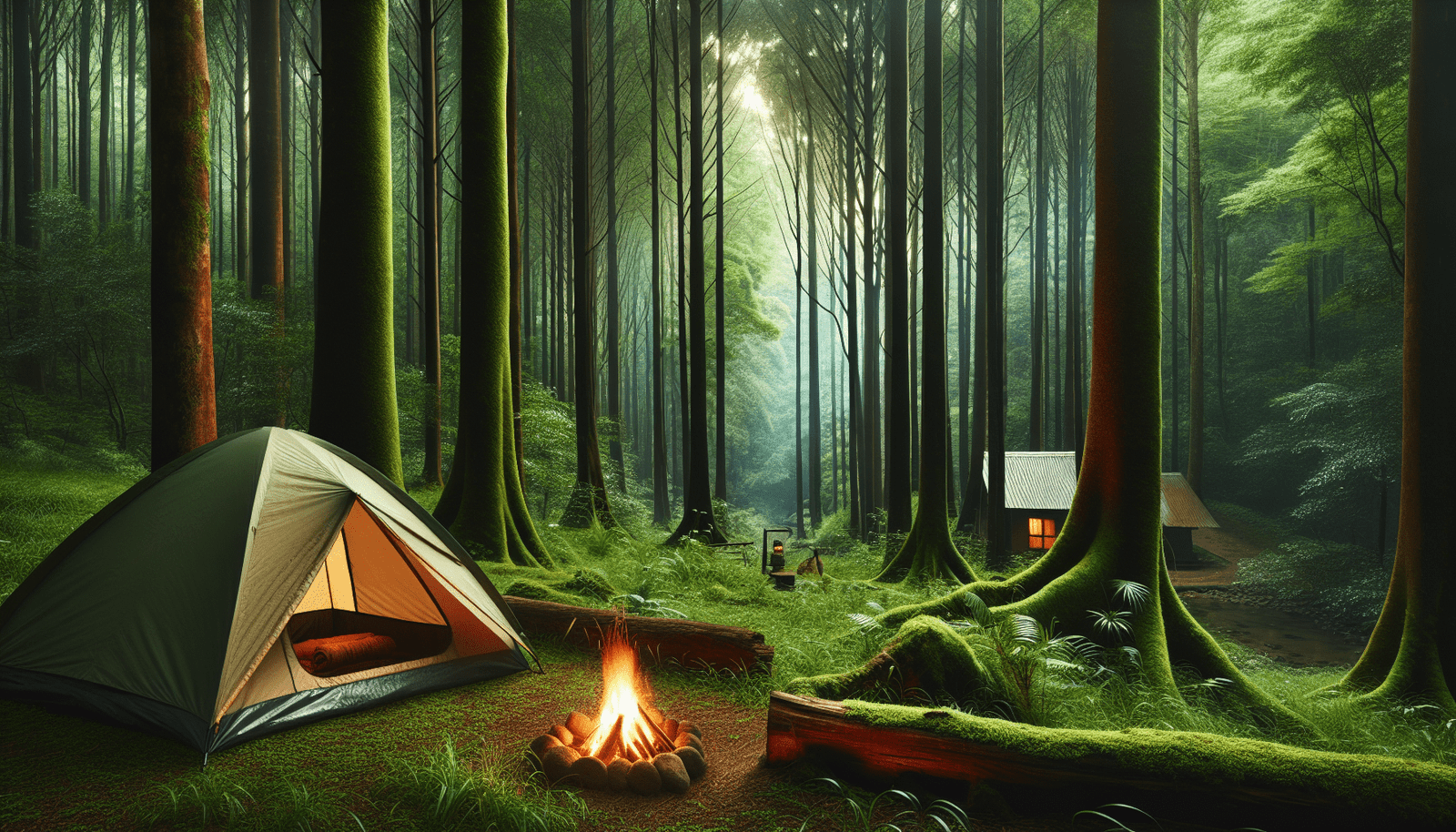Welcome to the wonderful world of camping, where nature is your co-adventurer, and every moment can turn into a lasting memory. In “What Is The Rule #1 Of Camping?”, you’ll dive into the essential guideline that every happy camper swears by. This rule isn’t just a tip; it’s a golden principle that ensures your experience is safe, enjoyable, and respectful of the great outdoors. So, grab your gear and let’s uncover the cornerstone of a perfect camping trip together!
What Is The Rule #1 Of Camping?
Have you ever found yourself excited about the prospect of a serene weekend in nature, only to pause and wonder, “What is the rule #1 of camping?” Whether you’re a seasoned camper or just starting out, it’s crucial to know this golden rule to ensure an enjoyable and responsible outdoor experience. So, what is it?
The Golden Rule: Leave No Trace
Yes, the number one rule of camping is: Leave No Trace. This principle encompasses a host of guidelines and practices aimed at preserving nature for everyone to enjoy. By adhering to this rule, you ensure that your camping activities do not negatively impact the environment. Let’s delve into the nitty-gritty of how you can apply this essential camping ethic.
Why Leave No Trace?
First off, understanding why we should leave no trace helps in appreciating its importance. Campgrounds and trails are shared spaces, frequented by many adventurers throughout the year. Leaving no trace ensures:
- Environmental Preservation: Protects flora and fauna from human interference.
- Sustainability: Keeps the campsite welcoming for future campers.
- Aesthetic Value: Maintains the natural beauty of outdoor spaces.
The Seven Principles of Leave No Trace
The Leave No Trace Center for Outdoor Ethics simplifies this rule into seven actionable principles. Let’s explore each one.
1. Plan Ahead and Prepare
Proper planning can make the difference between a successful camping trip and a miserable one. Preparing for your camping trip involves considering:
- Weather Conditions: Pack appropriate gear for the forecast.
- Permits and Regulations: Know the rules of the area you’re visiting.
- Group Size: Smaller groups have less impact on the environment.
2. Travel and Camp on Durable Surfaces
Sticking to established trails and campsites minimizes your impact on the environment. Ideal surfaces include:
- Trails: Stick to established paths to prevent erosion.
- Campsites: Look for well-established sites, typically marked, to pitch your tent.
3. Dispose of Waste Properly
The “pack it in, pack it out” mantra is a key component of the Leave No Trace ethic. This principle covers:
- Garbage: Carry out all your trash. Bring multiple bags to separate waste.
- Human Waste: Utilize designated toilets or dig cat holes 6-8 inches deep and at least 200 feet away from water sources.
4. Leave What You Find
This principle encourages you to leave natural and cultural artifacts untouched. This includes:
- Natural Objects: Leaves, rocks, and plants should remain undisturbed.
- Historical Artifacts: Refrain from taking arrowheads or other cultural items as souvenirs.
5. Minimize Campfire Impact
While cooking over an open fire can be fun, it’s better to use a camp stove for minimal impact. If you must make a fire, consider:
- Fire Rings: Use established fire rings to contain the fire.
- Wood: Collect small sticks from the ground rather than cutting wood from trees.
6. Respect Wildlife
Wildlife encounters can be one of the most rewarding experiences in nature, but it’s essential to keep your distance. Key practices include:
- No Feeding: Feeding animals can disrupt their natural behaviors.
- Observe from Afar: Use binoculars to observe animals without disturbing them.
7. Be Considerate of Other Visitors
Camping is a communal activity, so it’s important to:
- Keep Noise Levels Down: Respect the peace and quiet of others.
- Yield on Trails: Allow ascending hikers or faster groups to pass you easily.
Tips for First-Time Campers
If you’re new to camping, you’re in for an adventure! However, stepping into the great outdoors unprepared can be overwhelming. Here are some beginner-friendly tips to make your first camping trip a hit.
Choosing the Right Campsite
Urban Campgrounds vs. Backcountry Camping
Choosing a campsite is dependent on your comfort level and experience:
| Aspect | Urban Campgrounds | Backcountry Camping |
|---|---|---|
| Accessibility | Easily accessible | May require a long hike |
| Amenities | Bathrooms, showers | Minimal to none |
| Population | Crowded | More secluded |
| Experience Level | Beginner-friendly | Best for experienced campers |
Essential Camping Gear
Here’s a checklist of essential gear to bring along:
- Tent and Sleeping Bag: Invest in quality for comfort and protection.
- Cooking Supplies: Portable stove, pots, and utensils.
- Clothing: Layered clothing to suit varying temperatures.
- First Aid Kit: A must for any unexpected injuries.
- Navigation Tools: Maps, compass, and GPS devices.
Meal Planning
Planning your meals in advance saves you loads of hassle:
- Easy-to-Cook Meals: Opt for one-pot meals or grill-friendly food.
- Snacks: Nuts, dried fruit, and energy bars keep you fueled.
- Water Supply: Always carry more water than you think you’ll need. Consider water purification options if you run out.
Safety Tips
Safety should always be your utmost priority:
- Inform Someone About Your Trip: Let someone know your itinerary and expected return.
- Weather Awareness: Check forecasts and prepare for sudden changes.
- Know the Wildlife: Understand what animals you might encounter and how to react.

Advanced Camping Tips
For those who’ve caught the camping bug and are looking to level up, here are some advanced tips to take your adventures to the next stage.
Lightweight Backpacking
Carrying less weight allows you to travel further and faster:
- Lightweight Gear: Opt for lighter alternatives for tents, sleeping bags, and cookware.
- Multipurpose Items: Use gear that serves multiple functions. For example, a poncho that doubles as a shelter.
- Dehydrated Food: Consider dehydrated or freeze-dried meals to save weight on food supplies.
Survival Skills
Hone your survival skills to better handle emergencies:
- Fire Building: Master starting a fire without matches.
- Navigation: Learn to navigate using just a map and compass.
- Water Sourcing: Know how to find and purify water from natural sources.
Eco-Friendly Camping Tips
Going a step further than Leave No Trace involves more eco-friendly practices:
- Biodegradable Products: Use eco-friendly soaps and toiletries.
- Solar Energy: Harness solar power for gadgets instead of batteries.
- Clean Energy Stoves: Opt for stoves that use alternative fuels like compressed gas.
FAQs
What Should I Do If I See a Wild Animal?
The first rule is to stay calm and do not approach. Many animals will leave you alone as long as you do the same for them. Make noise to alert animals of your presence and carry bear spray in areas where bears are common.
How Can I Entertain Myself and My Group While Camping?
There are countless ways to entertain yourself:
- Hiking and Exploring: Take advantage of nearby trails.
- Games: Bring along cards, board games, or a Frisbee.
- Storytelling and Music: Enjoy stories around the campfire or bring a guitar for some music.
What If I Get Lost?
If you find yourself lost, stay put and do not panic. Use your map and compass to try and understand your location. Signal for help using a whistle or by creating visible markers.

Conclusion
By following the Leave No Trace principles, you uphold the number one rule of camping and contribute to preserving nature for generations to come. Whether you’re a first-time camper or a seasoned adventurer, these guidelines ensure that the stunning landscapes you love to explore remain pristine and welcoming for everyone.
Camping offers a rich tapestry of experiences that connect you with nature and with yourself. Armed with the knowledge and tips from this guide, you’re now ready to embark on your next great outdoor adventure responsibly and considerately. Happy camping!
